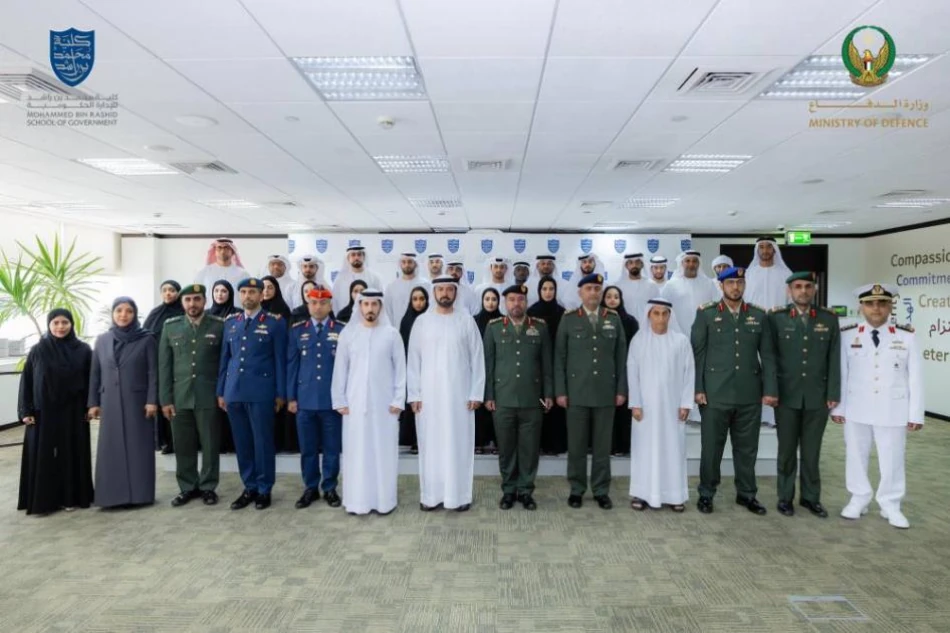
Empowering Future Leaders: New Diplomacy Programmes Launched
UAE Defense Ministry Partners with Leadership Academy to Build Next-Generation Government Leaders
The UAE is doubling down on its strategic investment in human capital development through a new partnership between the Mohammed Bin Rashid School of Government and the Ministry of Defense. Two specialized leadership programs launched this month signal the Emirates' commitment to preparing a new generation of government leaders capable of navigating complex institutional transformation while maintaining the country's competitive edge regionally and globally.
Strategic Partnership Addresses Critical Leadership Gap
The collaboration introduces the second cohort of the "Future Leaders Diploma" program alongside the inaugural "Young Leadership Empowerment Diploma," both specifically designed for Defense Ministry personnel. This initiative reflects a broader trend across Gulf nations to professionalize government services and build institutional capacity ahead of economic diversification goals.
Khalifa Rashid Al Hameli, Director of the Defense Minister's Office, emphasized the ministry's focus on practical leadership tools that enable strategic decision-making and efficient team management. "We anticipate these programs will directly contribute to enhancing the ministry's readiness and flexibility in facing future challenges," he stated.
Beyond Traditional Training: A Knowledge-Based Approach
Unlike conventional government training programs, these diplomas integrate theoretical knowledge with field experience through real-world projects and dialogue sessions with senior leaders and experts. This approach mirrors successful leadership development models seen in Singapore's civil service and reflects the UAE's broader shift toward a knowledge-based economy.
Dr. Ali bin Sebaa Al Marri, CEO of the Mohammed Bin Rashid School of Government, positioned the programs as strategic steps in developing government capabilities that align with rapid changes in the public sector. The curriculum focuses on change management and institutional innovation—critical skills as the UAE navigates post-oil economic planning and regional geopolitical shifts.
Practical Implementation Over Academic Theory
Aisha Al Shamsi, Director of Executive Education at the school, highlighted the programs' foundation in extensive research into Defense Ministry leadership needs. The curriculum emphasizes building strategic thinking capabilities and enabling participants to create measurable impact within their work environments.
This focus on practical application addresses a common criticism of government training programs across the region, where theoretical knowledge often fails to translate into institutional improvements. The UAE's approach suggests lessons learned from previous capacity-building initiatives.
Regional Leadership Development Context
The timing of this partnership aligns with broader regional trends in government modernization. Saudi Arabia's Vision 2030 includes similar leadership development components, while Qatar has invested heavily in public sector capacity building since 2017. However, the UAE's integration of defense and civilian leadership development represents a more comprehensive approach to institutional preparedness.
The defense ministry focus is particularly significant given the UAE's active regional security role and its positioning as a stable hub for international business and diplomacy. Developing strategic thinking capabilities within defense leadership could enhance the country's ability to balance security commitments with economic development priorities.
Investment Returns and Future Implications
For government efficiency observers, this partnership represents a measurable commitment to institutional development that could yield concrete returns in policy innovation and implementation effectiveness. The emphasis on change management skills suggests preparation for significant institutional reforms or operational shifts within the defense sector.
The program's success could establish a template for similar partnerships across other UAE government entities, potentially accelerating the country's transition toward more agile, knowledge-driven public administration. This would support broader economic diversification goals while maintaining the institutional stability that has become a key UAE competitive advantage.
Most Viewed News

 Omar Rahman
Omar Rahman






